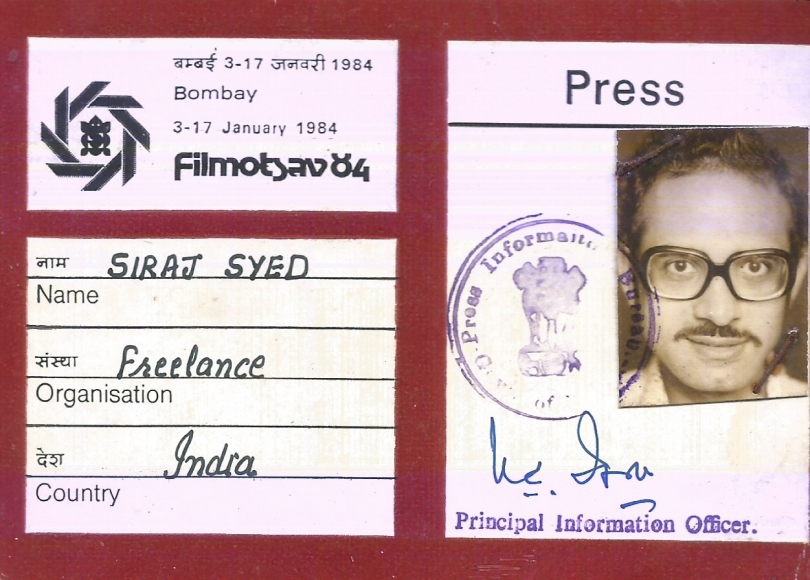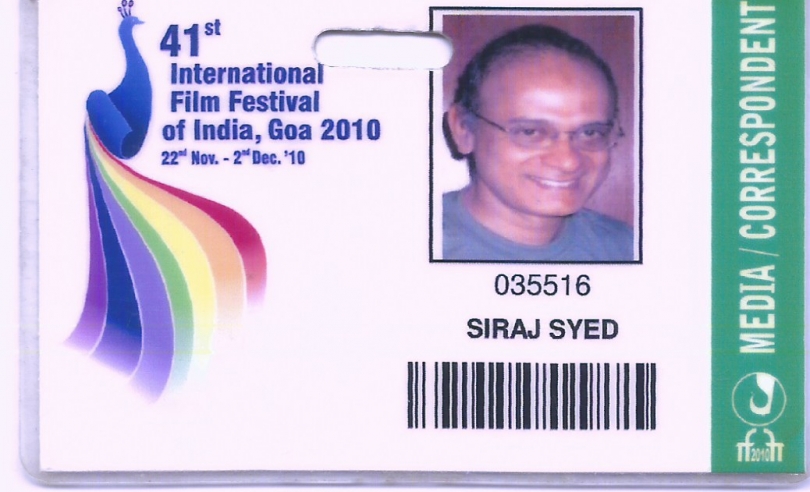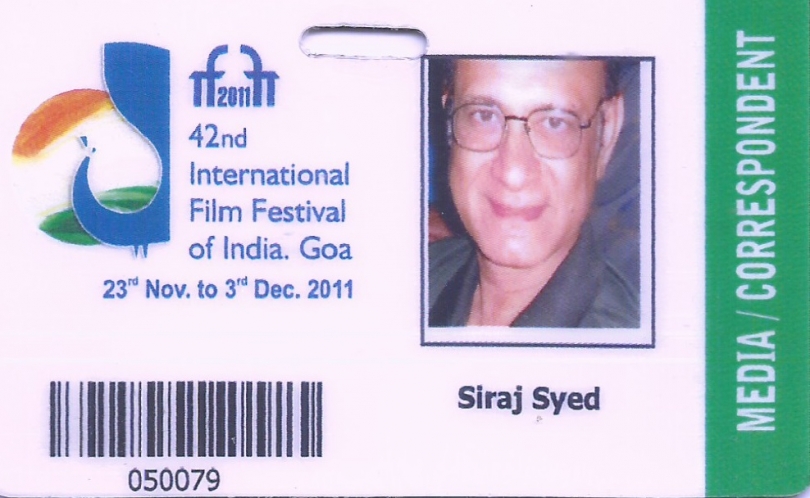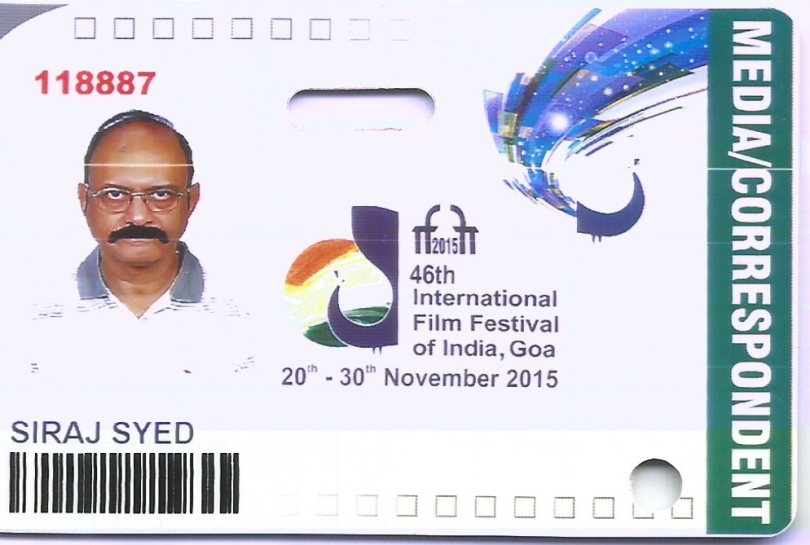|
|
||
|
Pro Tools
FILMFESTIVALS | 24/7 world wide coverageWelcome ! Enjoy the best of both worlds: Film & Festival News, exploring the best of the film festivals community. Launched in 1995, relentlessly connecting films to festivals, documenting and promoting festivals worldwide. Working on an upgrade soon. For collaboration, editorial contributions, or publicity, please send us an email here. User login |
IFFI 50: Those were the days
IFFI 50: Those were the days International Film Festival of India (IFFI) at 50 is a shortened, dry and sanitised version of what it used to be, till about a decade ago. The powers that be realised those days that a film festival should not be a rushed affair as far as film viewings go, and a film festival is a festival too. Film personalities, who travel up to 20,000 kms, to be at the event, deserve to be entertained and looked after, in real Indian hospitality style. Festivities were not confined to the opening and closing ceremonies, as is largely the case these days.
At its peak, the festival used to last a full 17 days, with the first two days reserved for screening previews for the media, in advance of the starting of the festival, giving them enough time to publish reviews of 6-8 films. The dates that frequently come to mind are 03-17 January, with screenings beginning on the 1st of January (see scanned image of my accreditation card for Filmotsav 1984). Every alternate year, the festival would travel to cities like Mumbai, Hyderabad, Kolkata, Chennai, Thiruvananthapuram and Bangalore, assuming the alter ego of Filmotsav, which means Filmfestival in Hindi. This would be the non-competitive version of the festival. The following year it would shift back to New Delhi, as IFFI, the competitive film festival. Two bodies were jointly involved in organising the festival: the Directorate of Film Festivals (DFF) in the Ministry of Information and Broadcasting, and the Press Information Bureau (PIB), the media and public relations wing of the Ministry of I & B. The PIB handled all aspects of media, from registration to setting up a media centre, to issuing press releases, to fixing up interviews to providing photographs. PIB is still around, doing part of its earlier duties, but two other agencies have stepped in: Entertainment Society of Goa and an ever-changing PR agency. ESG came in when IFFI moved to Goa, merging its IFFI and Filmotsav avatars, and setting up a permanent base there.
For the first few years, we did not miss the earlier versions, as the red carpet was rolled out not only to the dignitaries but also the press. Some of the things we enjoyed were early previews, free snacks, boat cruises with drinks and dinner on board, parties in cosy shacks tucked away in remote, cosy corners, breakfast get-togethers organised by various film delegations, free beer, live entertainment at parties, dancing, with senior personnel joining in, coaches willing to drop you to the location of your choice even at odd hours, a boat anchored near Kala Academy, offering snacks and drinks to whosoever boarded it, an Open Forum in truly open spaces, etc. Indeed, we almost forgot that the two Filmotsavs held in Hyderabad could top all this any time. Goa has certainly become the second most exciting destination for IFFI, after the legendary and unforgettable Hyderabad outings, when we were spoilt to the core. How can one forget that members of the South Indian Film Chamber of Commerce used to stand in a queue, handing over lunch boxes from a five-star hotel, as we exited the cinema halls after the noon show. Servings of traditional Hyderabadi food and programmes of fervent qavvaalees were just part of the agenda. We ven forgot that, when IFFI was in New Delhi, we used to be taken for two excursions, one right up to the Taj Mahal in Agra, and other covering local sights,near Delhi.
Back in Goa, things began to change. Firstly, the festival itself shrunk, from 12 days (November 22-December 02/November 23-December 03), to 11 days (November 20-30) to 9 days (November 20-28). Since only one film is shown on the opening day and two shows are held on the closing day, we can count these 9 days as 8. Effectively, IFFI now lasts for half the duration of its best days. The practice of showing films in advance has been discontinued, as is the practice of asking senior journalists to conduct press conferences. Cruises are non-existent, the breakfast gatherings, lunch press conferences, hotel-room interactions and the anchored boat are thing of the past. Strictly limited numbers of biscuits are served along with tea/coffee, at fixed hours, on a first come first served basis. Barely one or two delegations host parties, and the invites to these parties are strictly limited. PIB’s own party is a dry affair, with no liquor, only food and piped music. Incidentally, the PIB used to throw not one but two parties earlier. ESG throws two parties, one under its own aegis, and the other on behalf of the Chief Minister of Goa, who is ex-officio Chairman of ESG. Both these parties are out of bounds for journalists, unless you happen to be a local favourite. The second is the closing dinner, where journalists could get priceless copy from the award winning dozen odd personalities, but ESG is unconcerned, and keeps journalists apart from the winners after the results are announced, till the end of the day. Most journalists leave the next morning for their base towns, without any interaction with the awardees Coaches are scarce and ply only between fixed points. Entertainment is confined only to the opening and closing ceremonies, and some of the master classes, the latter being treated like a regular film show, with advance booking. Free beer? You must be kidding. A decent festival bag has given way to cheap stuff, not worthy of being carried around. Its contents no more include a chocolate and discount vouchers at nearby retail outlets. Media is now housed in a smaller room, that has fewer chairs and computer terminals, and the Press Conference room often overflows, with many scribes standing. It also accommodates at least four organisations: PIB’s own personnel, All India Radio, Doordarshan (India’s state-run TV service) and the PR agency. Together, these personnel add up to about 50. That leaves a mere 30-odd places, for a media contingent about 450 strong. If you find a vacant chair, that is your lucky day. Invitations to any of the cocktails/dinners are at a premium, and many journalists are forced to curry favours with ESG and DFF to procure them. Yes, even the DFF dinner is an exclusive event. Those who succeed flaunt them like trophies. The National Film Development Corporation, which used to be an integral part of the festival, now runs a parallel film bazaar, some 3 km from the festival’s main venue, at a five star hotel. It runs for four days, and includes a networking cocktail every evening. Those who register for the bazaar are automatically registered for IFFI, but vice versa is not the case. Strict screening and grilling interviews are held before journalists registered for IFFI are allowed into the bazaar. Here, again, the fortunate few are invited to the cocktails. The bazaar takes away a large chunk of the festival attendees, with many high voltage sessions, presentations and screenings. Many start attending IFFI only after the fifth day, because the bazaar ends by then. Inaugural and closing ceremonies are held at a stadium, miles away, to accommodate and placate a large turnout of local population, perhaps to appease political party workers, unlike the early years, when Kala Academy, with a capacity of around 1,000, would suffice. The Open Forum is now held on the first floor, of course, though with open doors.
What are the reasons for these curtailments? Only the Ministry of Information and Broadcasting knows. Cuts in budget are often cited. Cuts no ice, to be sure. In 2019, DFF and ESG together spent Rs. 40 (400 million) crore on IFFI. An expense of Rs. 1 crore, 2.5% of this amount, could take care of all the expenses needed to restore the festival to its former glory. Of course, to make it a 15-day festival might mean a higher investment, but look at the anomalies. The fest wants to show more films. It wants to retain more venues. It strives to register more delegates. And it reduces the duration as well as the budget of the festival. Can these elements co-exist? The I & B Ministry has known for a good 45 years or so that it will be hosting an annual film festival. Costs of holding the festival can be calculated well in advance, based on audited accounts of each year. So what should be the budget? Last year’s costing, plus allowances for inflation and growth. Ideally, if Rs. 40 crore was spent on IFFI 2019, the budget for IFFI 2020 has to be at least Rs. 50 crore. From what I have gathered about trends over the years, the amount that is sanctioned for IFFI 2020 could well be Rs. 30 crore. If this happens, instead of an increase of 20%, year-on-year, we would be faced with a 25% reduction, year-on-year. What effect such a cut would have on the organising of the festival and providing amenities and entertainment, one can easily imagine. Unlike some luxuries, IFFI is not a perk or bonus given to employees. It is an international socio-cultural-artistic event that involves India playing host to films from about a hundred countries (well, 76, if you go by the 2019 figure), invited foreign delegates that number in hundreds, and has been a fixture since 1952. Nobody should treat it otherwise. As an IFFI veteran, who has attended the annual event from 1976, a few misses notwithstanding, and has completed 50 years of film criticism, I sincerely hope that wiser counsel will prevail. Festivities and amenities must come back, the festival must go back to a 15-day affair and budgets must increase every year, without fail. Growth cannot be measured only in terms of the number of delegates registered and the number of films screened. With some effort, the number of screens can increase to 100 and the number of films screened (not counting repeat shows) can go up to 100 x 5=500. Even the number of delegates can hit 25,000. Great! But are you going to still keep cutting budgets and withdrawing amenities and festivities in inverse proportion? That’s illogical, to say the least. 09.12.2019 | Siraj Syed's blog Cat. : Ambiance DFF ESG Filmotsav PIB FESTIVALS
|
LinksThe Bulletin Board > The Bulletin Board Blog Following News Interview with EFM (Berlin) Director
Interview with IFTA Chairman (AFM)
Interview with Cannes Marche du Film Director
Filmfestivals.com dailies live coverage from > Live from India
Useful links for the indies: > Big files transfer
+ SUBSCRIBE to the weekly Newsletter Deals+ Special offers and discounts from filmfestivals.com Selected fun offers
> Bonus Casino
User imagesAbout Siraj Syed Syed Siraj Syed Siraj (Siraj Associates) Siraj Syed is a film-critic since 1970 and a Former President of the Freelance Film Journalists' Combine of India.He is the India Correspondent of FilmFestivals.com and a member of FIPRESCI, the international Federation of Film Critics, Munich, GermanySiraj Syed has contributed over 1,015 articles on cinema, international film festivals, conventions, exhibitions, etc., most recently, at IFFI (Goa), MIFF (Mumbai), MFF/MAMI (Mumbai) and CommunicAsia (Singapore). He often edits film festival daily bulletins.He is also an actor and a dubbing artiste. Further, he has been teaching media, acting and dubbing at over 30 institutes in India and Singapore, since 1984.View my profile Send me a message The EditorUser contributions |
































